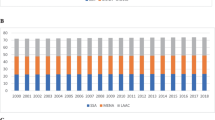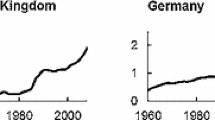Abstract
This paper evaluates the impact of information and communication technology (ICT) on economic growth in Africa based on a sample of 54 countries from 2005 to 2015. The sample is further divided along five sub-regions and the outcomes measured by estimating pooled ordinary least squares, random and fixed effects and system generalised method of moments models. The ICT indicators are individuals using the internet, mobile subscribers and fixed telephone subscribers with trade openness and inflation rate as control variables. Findings, among others, reveal that (1) ICT development has a statistically significant positive relationship with economic growth, (2) the output elasticities of the three ICT indicators are significantly different, (3) the “leapfrogging” hypothesis holds, (4) mobile subscription has the largest output elasticity across all specifications and has the biggest potentials to enable Africa to skip traditional developmental stages, (5) regressions for the sub-samples show statistically significant differences of the output elasticity of ICT indicators. The study recommends that concerted efforts must be directed towards harnessing the inherent benefits of ICT usage which includes reducing the rising cost attributable to the usage of communication technology facilities such as the cost of buying a cellular phone, internet connectivity rates, subscription rates and so on.
Similar content being viewed by others

References
Asongu, S.A., & Le Roux, S. (2017). Enhancing ICT for inclusive human development in Sub-Saharan Africa. Technological Forecasting and Social Change, 118, 44–54.
Baro, E.E., & Endouware, B.-E.C. (2013). The effects of mobile phones on socio-economic life of the rural dwellers in the niger delta region of Nigeria. Information Technology for Development, 19(3), 249–263. https://doi.org/10.1080/02681102.2012.755895.
Batuo, E.M. (2015). Role of telecommunications infrastructure in the regional economic growth of Africa. The Journal of Developing Areas, 49(1), 1–19.
Cardona, M., Kretschmer, T., Strobel, T. (2013). ICT and productivity: conclusions from the empirical literature. Information Economics and Policy, 25(3), 109–125.
Chavula, H.K. (2013). Telecommunications development and economic growth in Africa. Information Technology for Development, 19(1), 5–23. https://doi.org/10.1080/02681102.2012.694794.
Chen, Y., Farinelli, U., Johansson, T.B. (2004). Technological leapfrogging: a strategic pathway to modernization of the Chinese iron and steel industry. Energy for Sustainable Development, 3(2), 18–26.
Dedrick, J., Kraemer, K.L., Shih, E. (2013). Information technology and productivity in developed and developing countries. Journal of Management Information Systems, 30(1), 97–122.
Ejemeyovwi, J.O., & Osabuohien, E.S. (2018). Investigating the relevance of mobile technology adoption on inclusive growth in west Africa. Contemporary Social Science https://doi.org/10.1080/21582041.2018.1503320.
Fong, M.W.L. (2009). Technology leapfrogging for developing countries. Encyclopedia of Information Science and Technology, Second Edition, 7 pages.
Hanclova, J., Doucek, P., Fischer, J., Vltavska, K. (2015). Does ICT capital affect economic growth in the EU-15 and EU-12 countries? Journal of Business Economics and Management, 16(2), 387–406. https://doi.org/10.3846/16111699.2012.754375.
Jorgenson, D.W., & Vu, K.M. (2011). The rise of developing Asia and the new economic order. Journal of Policy Modeling, 33(5), 698–716.
Kuada, J. (2015). Private enterprise-led economic development in Sub-Saharan Africa. New York: Palgrave Macmillan.
Levendis, J., & Lee, S.H. (2013). On the endogeneity of telecommunications and economic growth: evidence form Asia. Information Technology for Development, 19(1), 62–85. https://doi.org/10.1080/02681102.2012.694793.
Niebel, T. (2014). ICT and economic growth - comparing developing, emerging and developed countries. Paper presented at the IARIW 33rd General Conference, Rotterdam, the Netherlands, August 24-30, 2014.
Papaioannou, S., & Dimelis, S. (2007). Information technology as a factor of economic development: evidence from developed and developing countries. Economics of Innovation and New Technology, 16(3), 179–194.
Solow, R.M. (1956). A contribution to the theory of economic growth. The Quarterly Journal of Economics, 70(1), 65–94.
Steinmueller, W.E. (2001). ICTs and possibilities for leapfrogging by developing countries. International Labour Review, 140(2), 1–18.
Ugwuegbe, S.U., & Uruakpa, P.C. (2013). The impact of capital formation on the growth of nigerian economy. Research Journal of Finance and Accounting, 4(9), 36–42.
UNDP. (2017). Income inequality trends in Sub-Saharan Africa: divergence, determinants and consequences. retrieved from http://www.africa.undp.org/content/rba/en/home/library/reports/income-inequality-trends-in-sub-saharan-africa--divergence--dete.html.
United Nations. (2011). Information economy report 2011: ICTs as an enabler for private sector development. Retrieved from https://www.wto.org/english/tratope/inftece/sympmay12e/speaker19fredriksson.pdf.
Vu, K.M. (2011). ICT as a source of economic growth in the information age: empirical evidence from the 1996-2005 period. Telecommunications Policy, 35(4), 357–372.
World Bank. (2017). Leapfrogging: the key to Africa’s development? from constraints to investment opportunities. Retrieved from http://documents.worldbank.org/curated/en/121581505973379739/pdf/119849-WP-PUBLIC-Africa-Leapfrogging-text-with-dividers-9-20-17-web.pdf.
World Bank. (2017). World development indicators. Retrieved from https://data.worldbank.org/data-catalog/world-development-indicators.
Author information
Authors and Affiliations
Corresponding author
Additional information
Publisher’s note
Springer Nature remains neutral with regard to jurisdictional claims in published maps and institutional affiliations.
Appendix
Appendix
Rights and permissions
About this article
Cite this article
Adeleye, N., Eboagu, C. Evaluation of ICT development and economic growth in Africa. Netnomics 20, 31–53 (2019). https://doi.org/10.1007/s11066-019-09131-6
Accepted:
Published:
Issue Date:
DOI: https://doi.org/10.1007/s11066-019-09131-6



